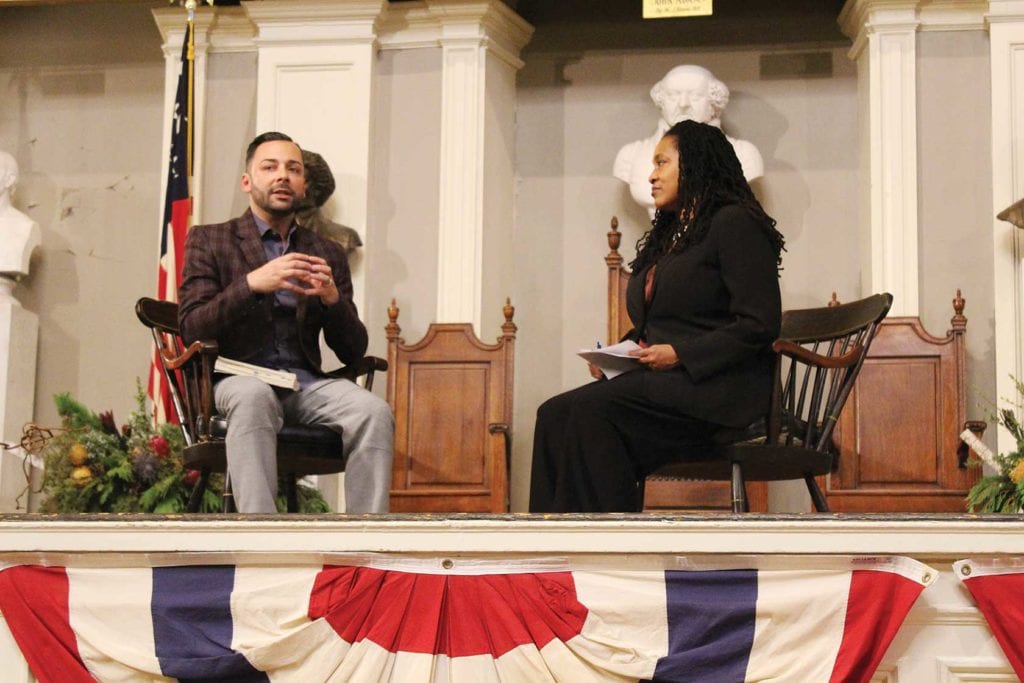Philanthropy plagued by colonial mind-set
Author says decolonization of wealth would heal racial divide

Colonial attitudes persist in the boardrooms of many charitable organizations, leading to a lack of diversity, internalized oppression and wealth inequity that belies philanthropy’s altruistic mission.
That was Native American author Edgar Villanueva’s message to the audience of about 200 social justice advocates celebrating the launch of Villanueva’s new book, “Decolonizing Wealth: Indigenous Wisdom to Heal Divides and Restore Balance,” in Faneuil Hall’s Great Hall last Friday afternoon.
“About 500 years ago, a virus touched the shores of this country, and I call that the ‘colonizing virus,’” said Villanueva, vice president of programs and advocacy for the Schott Foundation for Public Education, which organized the talk and book signing along with the Hyams Foundation, Emerging Practitioners in Philanthropy Boston and the Social Justice Funders Network.
“This virus was about the accumulation of wealth … a sickness that was undergirded by this idea of white supremacy,” said Villanueva, who drew on his heritage as an active member of North Carolina’s Lumbee Tribe to write critically but compassionately about what he sees as the harmful giving practices of charitable foundations.
“This colonizer virus and the dynamic it represents — dynamics of separation, the dynamics of exploitation, the dynamics of oppression, of control,” continued Villanueva, “still permeates into all of our systems and policies … [it] is baked into our DNA of who we are as a country, and all of us have subscribed to it at some point and at some level.”
Having spent 14 years working behind the scenes in the world of philanthropy, Villanueva argues that many organizations remain plagued by a colonial mindset that perpetuates internalized oppression and “savior complexes” that ultimately limit the autonomy of communities of color in determining their path to prosperity.
In the book, Villanueva points to the fact that private foundations are only required by the Internal Revenue Service to pay out 5 percent of their assets, leaving 95 percent of charity money to be invested in Wall Street funds that support controversial industries, including private prisons and non-renewable energy.
Villanueva also highlighted the lack of racial diversity in the distribution of charitable funds, with only 7 or 8 percent of the small amount of money released by foundations going to communities of color. This, he argued, stems from a lack of diversity in the governance and staffing of foundations, where between 85 to 90 percent of the boardrooms are white.
“Philanthropy by far is led and dominated by white folks, mostly white men,” said Villanueva. “There’s a direct correlation between who’s working in a foundation, who has power to make decisions and where resources are going.”
The author also said that the number of people of color working in philanthropy has declined in recent years due to “the problem of colonization and [the] white dominant mind-set that permeates in our space.” He explained, “We don’t allow people to be who they are, to bring their ways of doing work to the table, to bring different types of ideas and strategies … we may think we’re doing it in the name of good, but we might be perpetuating harmful colonizing dynamics in our community.”
There is a way out of this cycle, through decolonization and the equitable distribution of resources that starts with the “seven steps to healing” offered in Villanueva’s book.
“In order to bring us back together as one human race and restore balance to the land, we need to decolonize wealth,” said Villanueva. The steps include recognizing the trauma caused by colonization and apologizing to those who have suffered, as well as building racially diverse foundations, rather than providing one “token place at a colonial table.”
Villanueva warned that “decolonizing wealth, using our resources, using our wealth to dismantle white supremacy and to support racial healing” will be a long and painful process.
“To achieve racial justice is not going to be an easy path, my friend,” he said. “For us to come to terms with what has happened in this country, to get to a place where we can have realistic conversations about things like reparations, we’re going to have go to a dark, ugly place. But on the other side of that there’s going to be a freedom and a liberation and a healing that’s going to have us be the type of people that we truly want to be.”
Following his presentation, standing under a 7-foot portrait of colonial merchant, philanthropist and slave trader Peter Faneuil that loomed over the stage, Villanueva answered audience questions posed by Hyams Foundation Executive Director Jocelyn Sargent.
“Everyone has a responsibility to make things right,” said Villanueva. “All of our suffering is mutual, all of our healing is mutual, and all of our thriving is mutual,” he concluded.


![Banner [Virtual] Art Gallery](https://baystatebanner.com/wp-content/uploads/2024/04/Cagen-Luse_Men-at-store-e1713991226112-150x150.jpg)



